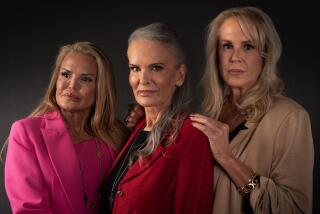‘90s FAMILY : O.J. Should Talk With the Batterers, Not Women
- Share via
So O.J. Simpson wants to speak to battered women about his relationship with Nicole? A 40-year-old Denver waiter has news for him.
“I can tell you from personal experience that battered women’s organizations couldn’t care less about anything you may have to say,” the waiter, who uses the pen name Paul Montana, wrote in an open letter to Simpson he sent to The Times. However, he went on to urge Simpson to share his experiences with another group that does want to hear from him--fellow and potential batterers.
“Talk to those of us who can relate to your struggles and pains. Talk to those of us who are so frustrated, sick and tired we could explode. Help us explore and work on and understand what’s going on inside of us.” Montana wrote.
In an interview, Montana said he has spent three years trying in vain to find constructive counseling. He enrolled voluntarily in programs in anger management and alcohol abuse. He tried private counseling. He went to women’s groups.
Still, his wife moved out and took the kids. And still, he doesn’t understand why, when he lost his temper, he gouged her flesh, twisted her neck, smothered her and threw tables at her. These days he goes home alone after work, knocks off a couple beers, puts his feet up and works on essays with titles like “What’s the Point.”
Counseling wasn’t a total waste of time. He knows the vocabulary of the cycle of abuse and how to control his behavior. He knows he doesn’t want to “do that to anyone I love.”
But he said he still needs more tools than the ones he got from young, authoritarian counselors--”a hammer and a screwdriver.” They judged him. They wanted him to sign contracts and “stay forever.” They refused to hear anything he had to say about his reasons, or the “little bobcat” he lived with.
Of course, abuse can never be justified, he acknowledged. “But for some reason it happened. Let’s talk about it. To say she has nothing to do with it is every bit as wrong as saying I have an excuse for hitting her.”
That view is as commonly heard as it is politically incorrect at batterers’ treatment programs, where few men come willingly.
It’s true the more motivated men can be turned off by techniques that are tailored for offenders who refuse to admit any responsibility at all, said Adrian Baca, manager of Los Angeles’ Center for the Prevention of Domestic Violence, where fewer than 5% of clients are enrolled voluntarily. (The center is experimenting with therapeutic groups for men who “graduate” from the basic course by demonstrating a willingness and capacity to learn alternate behaviors.)
Also, as Montana complained, the quality of counselors varies widely and some are pure “advocates” with no academic training. Some are just incompetent.
But at the same time, the men who voluntarily come for help are sometimes insincere and come just to show their partners they’re “good guys.” Some, like Montana, have even learned that women are attracted to a man who is “working on his issues.”
Montana’s ex-wife believes his efforts are sincere, but that his need to control remains so great that he continues to send her unwanted letters, poems and pictures.
Therapy cannot change anybody, said Baca. But he hopes men like Montana will keep on trying until they find suitable help.
“He has a six-foot green giant living inside of him. He has to be willing to work on it for the rest of his life.”
A true volunteer for treatment is halfway home. And as complex as the issues are, Baca said about Montana: “A guy like him has the best chance.”
More to Read
Sign up for Essential California
The most important California stories and recommendations in your inbox every morning.
You may occasionally receive promotional content from the Los Angeles Times.













